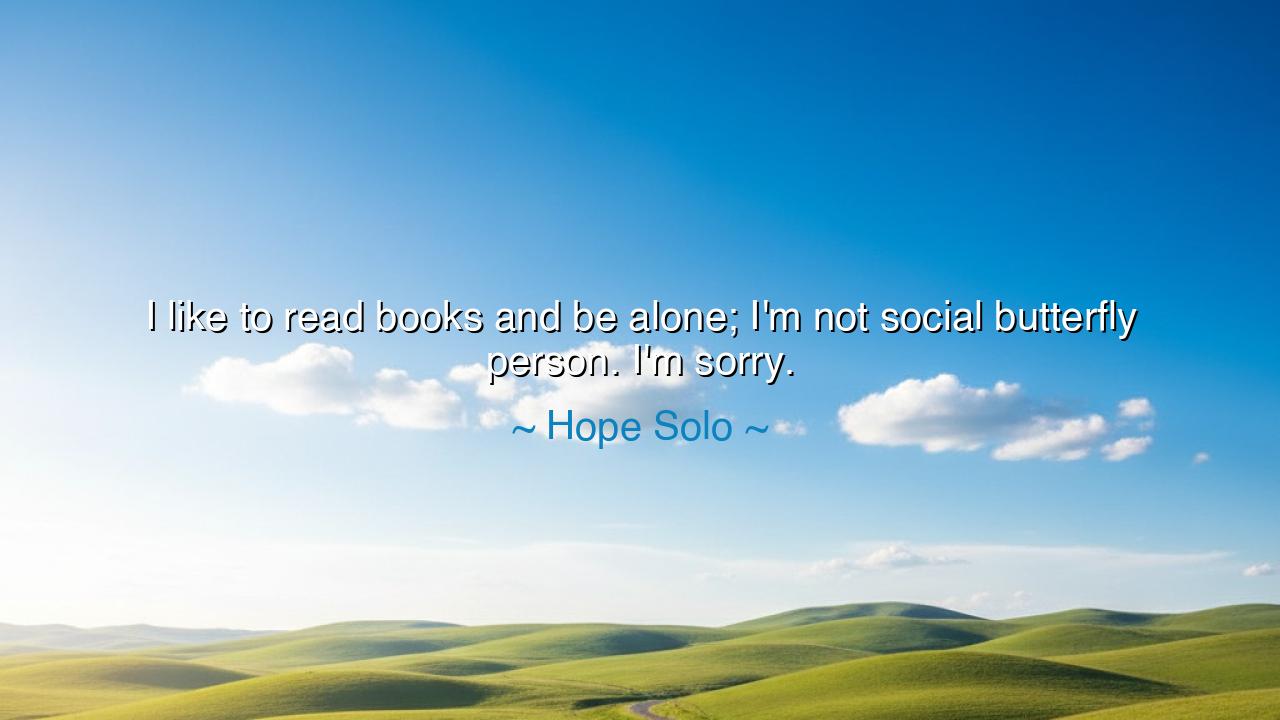
I like to read books and be alone; I'm not social butterfly






“I like to read books and be alone; I’m not a social butterfly person. I’m sorry.” — Hope Solo
In this quiet confession, Hope Solo, a warrior of the field and a champion of her craft, reveals something tender and timeless — the courage to embrace solitude. These words, simple as they seem, speak of a truth known to thinkers, poets, and wanderers of every age: that not all souls are nourished by crowds. Some draw their strength from silence. Some find their joy not in noise or fame, but in the sacred company of books and thought. Hope’s apology — “I’m sorry” — is not an admission of guilt, but the echo of a world that too often misunderstands the power of being alone.
In her life, she was known for her fire — fierce in competition, unyielding in spirit. Yet behind that armor of resolve was the heart of an introvert, one who needed stillness to restore her light. The world of sport, loud with shouts and adoration, leaves little room for solitude. But Hope, like the philosophers of old, knew that solitude is not loneliness. It is self-return — a journey back to the wellspring of strength. To read is to wander in the company of minds that have shaped the earth; to be alone is to listen to the whisper of one’s own soul.
Many of the great spirits of history shared this understanding. Leonardo da Vinci, the dreamer of machines and visions, withdrew from the courts of men to fill his notebooks in secret. Emily Dickinson, who rarely left her home, wrote words that carried the weight of eternity. Even Marcus Aurelius, an emperor surrounded by soldiers and senators, found refuge in solitude, writing his Meditations beneath the stars. Each of them, like Hope Solo, was no “social butterfly.” They were seekers of depth — choosing reflection over noise, authenticity over applause.
To be at peace in solitude requires courage. It is easy to fill the emptiness with company; it is hard to fill it with meaning. The one who can sit alone with a book and feel complete has discovered what many chase in vain — the contentment of inner life. For in that quiet, we meet ourselves without disguise. The noise of the crowd fades, and what remains is truth: our fears, our dreams, our essence. Hope’s love of reading, then, is not merely pastime — it is communion. Through the written word, she finds the friendship of minds long gone, the wisdom of ages that asks for no performance, no pretense.
In this age of constant connection, where silence is feared and solitude mistaken for sadness, Hope’s words shine like an ancient lantern. They remind us that there is beauty in withdrawal, that reflection is as noble as action. Just as the athlete rests between games to gather strength, the soul must retreat between days to restore its clarity. Solitude is not the absence of life; it is its purification. It strips away the trivial, leaving only the essential — the self unadorned, awake, and whole.
Let this be the lesson, O reader of ages to come: you do not need to flutter in every light to be radiant. If your joy is in books, in thought, in the quiet rhythm of your own heart — cherish it. Do not apologize for it, as Hope did. The world may call it isolation, but the wise call it communion with truth. The greatest discoveries, the deepest art, and the most enduring strength are born not in noise, but in silence.
So, be as she was: strong in solitude, fearless in reflection, and honest in who you are. Withdraw when you must. Read deeply. Think quietly. Speak only when your words carry the weight of your soul. For the butterfly may be admired for its beauty — but it is the rooted tree, silent and still, that endures through every storm.






AAdministratorAdministrator
Welcome, honored guests. Please leave a comment, we will respond soon